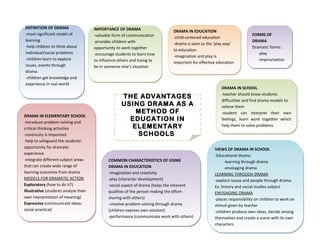Lga advantages of drama
- 1. DEFINITION OF DRAMA -most significant model of learning -help children to think about individual/social problems -children learn to explore issues, events through drama -children get knowledge and experience in real world DRAMA IN ELEMENTARY SCHOOL -introduce problem-solving and critical-thinking activities -continuity is important -help to safeguard the studentsŌĆÖ opportunity for dramatic experience -integrate different subject areas that can create wide range of learning outcomes from drama MODELS FOR DRAMATIC ACTION Exploratory (how to do it?) Illustrative (students analyze their own interpretation of meaning) Expressive (communicate ideassocial practical) IMPORTANCE OF DRAMA -valuable form of communication -provides children with opportunity to work together -encourage students to learn how to influence others and trying to be in someone elseŌĆÖs situation DRAMA IN EDUCATION -child-centered education -drama is seen as the ŌĆśplay wayŌĆÖ to education -imagination and play is important for effective education THE ADVANTAGES USING DRAMA AS A METHOD OF EDUCATION IN ELEMENTARY SCHOOLS COMMON CHARACTERISTICS OF USING DRAMA IN EDUCATION -imagination and creativity -play (character development) -social aspect of drama (helps the inherent qualities of the person making the effortsharing with others) -creative problem solving through drama (children express own solution) -performance (communicate work with others) FORMS OF DRAMA Dramatic forms: -play -improvisation DRAMA IN SCHOOL -teacher should know students difficulties and find drama models to relieve them -student can interpret their own feelings, learn work together which help them to solve problems VIEWS OF DRAMA IN SCHOOL -Educational drama: -learning through drama -envisaging drama LEARNING THROUGH DRAMA -explore issues and people through drama. Ex: history and social studies subject ENVISAGING DRAMA -places responsibility on children to work on stimuli given by teacher -children produce own ideas, decide among themselves and create a scene with its own characters

